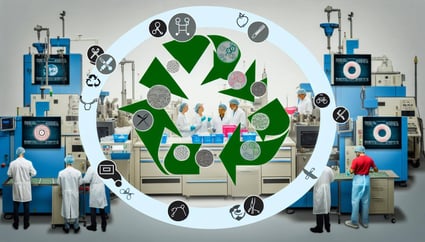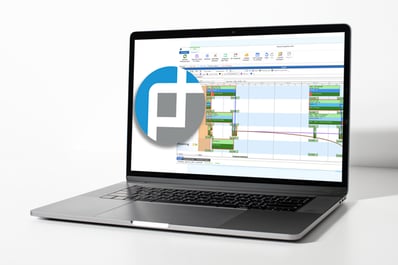Circular Economy and Waste Reduction
In the intricate web of modern manufacturing, every decision has a ripple effect, not just on the bottom line, but also on the environment. As a Production Planner in a medical manufacturing facility, your role is pivotal in orchestrating operations that meet both production demands and sustainability goals. The concept of a circular economy, where resources are reused, recycled, or repurposed, presents an opportunity to revolutionize manufacturing practices.
In this blog, we'll explore how embracing a circular economy mindset and leveraging advanced planning tools like PlanetTogether integrated with leading ERP, SCM, and MES systems can lead to significant waste reduction and increased efficiency in medical manufacturing.

Circular Economy
The traditional linear economy model of "take, make, dispose" is becoming increasingly unsustainable in the face of environmental challenges. The circular economy offers an alternative approach, aiming to minimize waste and maximize the lifespan of resources. It's about designing out waste and pollution, keeping products and materials in use, and regenerating natural systems.
Challenges in Medical Manufacturing
Medical manufacturing is not exempt from the challenges posed by traditional linear models. The industry generates significant amounts of waste, from packaging materials to production scrap, all of which have environmental and economic implications. Moreover, stringent regulatory requirements and the need for product safety further complicate manufacturing processes.

The Role of Production Planning
As a Production Planner, your decisions influence the entire manufacturing process. Optimizing production schedules, resource allocation, and inventory management are critical to meeting production targets while minimizing waste. Integration between advanced planning tools like PlanetTogether and ERP, SCM, and MES systems enhances your ability to make data-driven decisions in real-time.

Integration with ERP, SCM, and MES Systems
The integration of advanced planning tools like PlanetTogether with leading ERP, SCM, and MES systems such as SAP, Oracle, Microsoft, Kinaxis, and Aveva streamlines the entire manufacturing workflow. It provides seamless data exchange between planning, production, and resource management modules, enabling greater visibility and control over operations.
Benefits of Integration
Real-Time Data Accessibility: Integration allows for real-time access to critical data across departments, enabling better decision-making and responsiveness to changes in demand or supply.
Optimized Resource Utilization: By synchronizing production plans with resource availability, integration ensures optimal utilization of materials, equipment, and manpower, reducing waste and improving efficiency.
Streamlined Workflows: Automated data exchange between planning and execution systems streamlines workflows, minimizing manual intervention and reducing the risk of errors.
Enhanced Traceability and Compliance: Integration facilitates end-to-end traceability of materials and processes, ensuring compliance with regulatory requirements and quality standards.

Implementing Circular Economy Principles
Embracing circular economy principles in medical manufacturing requires a holistic approach that encompasses product design, production processes, and supply chain management. Here's how integration between advanced planning tools and ERP, SCM, and MES systems can support these efforts:
Design for Sustainability: Collaborate with product designers to incorporate eco-friendly materials and design principles that facilitate disassembly, repair, and recycling.
Waste Minimization: Optimize production schedules to minimize setup times, reduce overproduction, and eliminate bottlenecks, thereby minimizing waste generation.
Resource Recovery and Recycling: Implement processes for segregating and recovering valuable materials from production waste streams, facilitating their reuse or recycling.
Supplier Collaboration: Engage with suppliers to source sustainable materials and packaging solutions, promoting a closed-loop supply chain.
Continuous Improvement: Monitor key performance indicators (KPIs) related to waste generation, energy consumption, and resource efficiency, and implement continuous improvement initiatives based on data insights.
In the quest for sustainable manufacturing, the adoption of circular economy principles is not just a moral imperative but also a strategic advantage. As a Production Planner in a medical manufacturing facility, you play a crucial role in driving this transformation. By embracing circular economy principles and leveraging advanced planning tools like PlanetTogether integrated with ERP, SCM, and MES systems, you can unlock new opportunities for waste reduction, operational efficiency, and long-term sustainability. Together, let's build a future where manufacturing thrives in harmony with the planet.
Remember, every decision you make today shapes the world we'll inhabit tomorrow. Embrace the circular economy, and let's create a brighter, more sustainable future for all.
Are you ready to take your manufacturing operations to the next level? Contact us today to learn more about how PlanetTogether and integrated scheduling solutions can help you achieve your sustainability goals and drive success in the medical industry.